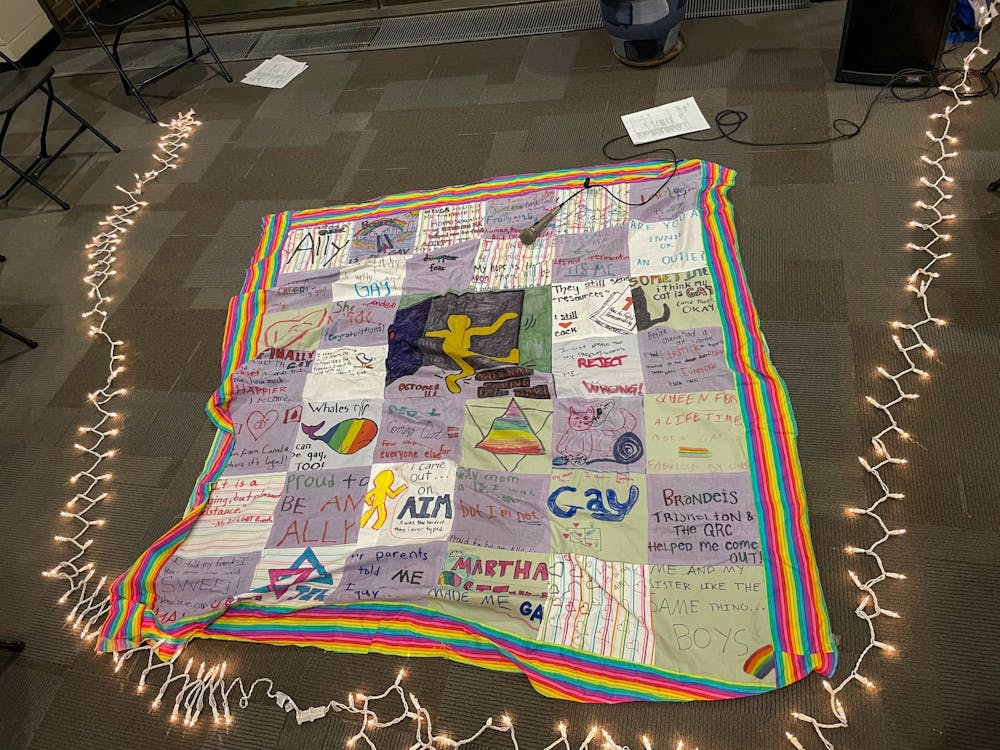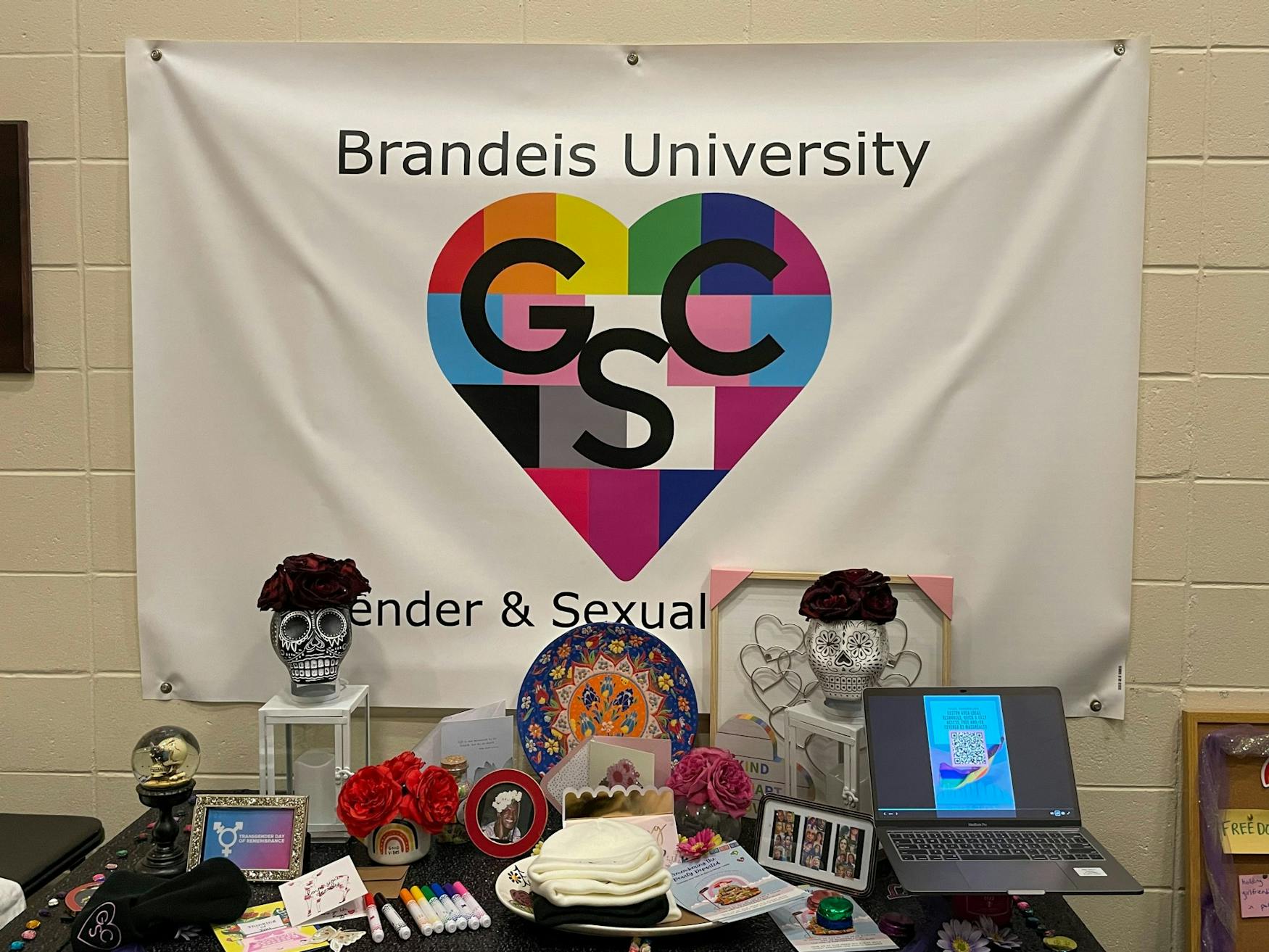A Night of Remembrance and Resilience
At Remember the Dearly Departed, hosted by the GSC in partnership with BLSO, students honored the transgender lives lost to violence this year.
Remember the Dearly Departed took place during Transgender Awareness Week on Nov. 16, four days before the National Transgender Day of Remembrance. Organized by the Gender and Sexuality Center and the Brandeis Latinx Student Organization, the event was held in honor of TDOR as well as Day of the Dead. The student-facilitated discussion featured hot chocolate, cookies and a patchwork Pride quilt placed in the middle of the discussion circle in Winer Lobby. Guest speaker Leo Austin-Spooner handed out a list of places to get involved with LGBTQIA+ organizations in the greater Boston area, including The Boston Alliance of LGBTQIA+ Youth’s Youth Leadership Committee, or BAGLY, before opening the discussion for participants to share their thoughts, feelings and anecdotes about grief and hope within the trans and genderqueer community.
Austin-Spooner, a first-year student at Boston University, is the co-chair of BAGLY’s Youth Leadership Committee, and was involved in the “Yes on 3” campaign, a successful 2018 ballot initiatve to uphold a Massachusetts law that prohibits discrimination on the basis of gender identity in public places. “I met other trans people for the first time, I met trans adults for the first time, being happy and joyful together, and that was new ... it made me feel really loved and it gave this purpose to me,” said Austin-Spooner about the campaign.
Transgender Day of Remembrance — held on Nov. 20 across the country — was started in 1999 by a small group of trans people in response to the 1998 murder of Rita Hester, a Black trans woman, in Allston, Massachusetts. “Transgender Day of Remembrance seeks to highlight the losses we face due to anti-transgender bigotry and violence,” said TDOR founder and trans rights activist Gwendolyn Ann Smith on the GLAAD website, “I am no stranger to the need to fight for our rights, and the right to simply exist is first and foremost. With so many seeking to erase transgender people — sometimes in the most brutal ways possible — it is vitally important that those we lose are remembered, and that we continue to fight for justice.”
The importance of intersectionality was also noted during the event. One participant described the ways in which ballroom culture — founded by Black and Latinx trans and genderqueer people in the 80s — was co-opted by non-POCs who then popularized it in mainstream culture as their own (for example, Madonna and her “vouging”). TDOR itself has been criticized for its role in allowing white trans people to center themselves, thus erasing the lives and experiences of trans and genderqueer POC — who are disproportionately affected by the fatal hate crimes that TDOR intends to raise awareness about — from mainstream LGBTQIA+ narratives. The resilience of trans and genderqueer POC in the face of these issues was a prevailing feature of the event.
“You’re carrying your people and your culture and your gender with you despite what everyone else is trying to do to you,” said Austin-Spooner, who refers to himself as Black and white biracial. “It’s not that we’re new, it’s not that we’re coming out of anything, it’s just that we’re holding on to who we are despite the force of whiteness.”
Eli Sobel, the Program Administrator at the Gender and Sexuality Center, also highlighted the importance of hope within TDOR. “While Trans Awareness Week may focus on educating people about the cruel realities of anti-trans violence, TDOR focuses more on lives lived than lives lost. It is a time to honor the memories of the deceased, to acknowledge the inherent dignity of their lives rather than emphasize the indignity of their deaths,” they said in an email correspondence with the Justice.
At least 44 trans people were killed in 2021 in the United States. The majority were women of color.
“Brandeis prohibits discrimination and harassment against students, staff, and faculty on the basis of gender identity/expression, including transgender identity, under applicable federal and Massachusetts law. For Brandeis-specific resources, please contact the Gender and Sexuality Center Director Julián Cancino at jcancino@brandeis.edu. To report an experience or concern regarding discrimination, harassment, or sexual violence please contact the Office of Equal Opportunity at oeo@brandeis.edu or the University Ombuds at brandeisombuds@brandeis.edu.” — Julián Cancino, director of the Gender and Sexuality Center
--------
In memory of:
Dustin Parker, Neulisa Luciano Ruiz, Yampi Méndez Arocho, Scott/ Scottlynn Devore, Monika Diamond, Lexi, Johanna Metzger, Serena Angelique Velázquez Ramos, Layla Pelaez Sánchez, Penélope Díaz Ramírez, Nina Pop, Helle Jae O’Regan, Tony McDade, Dominique “Rem’mie” Fells, Riah Milton, Jayne Thompson, Selena Reyes-Hernandez, Brian “Egypt” Powers, Brayla Stone, Merci Mack, Shaki Peters, Bree Black, Summer Taylor, Marilyn Cazares, Dio H. Ova, Queasha D. Hardy, Aja Raquell Rhone-Spears, Lea Rayshon Daye, Kee Sam, Aerrion Burnett, Mia Green, Michelle Michellyn Ramos Vargas, Felycya Harris, Brooklyn Deshuna, Sara Blackwood, Angel Unique, Skylar Heath, Yunieski Carey Herrera, Asia Jynae Foster, Chae’Meshia Simms, Kimberly Fial, Jaheim Pugh Jaheim Barbie, Courtney “Eshay” Key, Alexandria Winchester, and all other transgender and genderqueer people who lost their lives this year to violence.





Please note All comments are eligible for publication in The Justice.